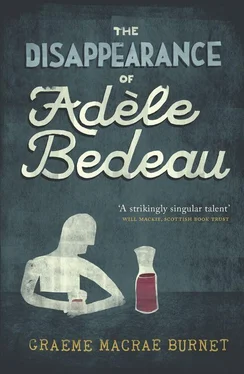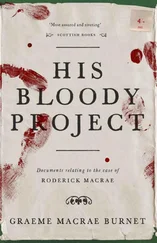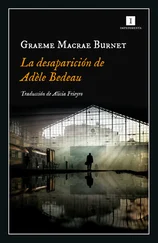‘I take care of those,’ said Manfred. He had started to grind his back teeth.
‘In what manner?’ Gorski’s tone was affable, curious, as if he was enquiring about an innocuous hobby.
Manfred clamped his jaw firmly shut. He wanted to cry out for Gorski to stop. He could not bear this relentless delving into his business. His fingernails whitened as he gripped the table.
‘Has Adèle Bedeau ever been in your apartment?’
The suggestion came so out of the blue that Manfred exhaled sharply. He attempted to pass off his response as laughter.
‘I’m glad you find this amusing, Manfred,’ Gorski went on. ‘The last time this girl was seen alive was in the vicinity of your apartment. You have consistently lied about seeing Mlle Bedeau on the two nights in question, leading me to conclude that there is something in your relationship with her that you wish to conceal.’
‘I have no relationship with Mlle Bedeau.’
‘Then why lie about it?’
Manfred said nothing.
‘Did Adèle Bedeau visit your apartment in the early hours of Friday morning?’
‘No,’ said Manfred. ‘She has never been in my apartment. She doesn’t even know where I live.’
‘Very well,’ said Gorski. He shook his head slowly, as if Manfred had disappointed him. Then he pushed himself off the wall he had been leaning against and left the room. Manfred exhaled. His heart was pounding. Slowly his breathing subsided. He wiped the sweat from his forehead with his handkerchief. Things were getting out of hand. He felt nauseous.
The officer from the reception desk appeared and asked Manfred to follow him. They walked back along the corridor leading to the reception area. The policeman pressed a buzzer and held the door open for Manfred.
‘Am I to wait?’ Manfred asked.
The policeman shook his head. ‘You’re free to go.’
Manfred stood bemused in the reception area for a few moments. Plainly Gorski was toying with him. He hesitated before exiting. Nobody intervened. He came to a halt on the pavement at the foot of the steps. His hands were shaking. The late afternoon air was still hot. He felt conspicuous in front of the police station, but the few passers-by paid no attention to him. Why should they? There was nothing out of the ordinary about him. He was just a man wiping his brow on a warm day. He stepped to the side of the pavement to allow a woman in North African dress and her three children to pass.
MANFRED LOOKED AT HIS WATCH. It was quarter past four. The bank would still be open. He should go back to work to put a stop to any gossip. He could say that he had been called in to identify a witness or something of that sort. He could even make light of the experience. That was what an innocent man would do — go back to work as if nothing untoward had occurred. Or perhaps an innocent man would be so shaken by the experience of being hauled into a police station that he would duck into the nearest bar and down a good measure of alcohol to calm his nerves. Manfred set off along the street in the opposite direction from the bank.
It struck him that Gorski must surely be having him watched. Having come close to accusing him, as he just had, of having something to do with Adèle’s disappearance, he would hardly let him walk free from the station without placing him under surveillance. Manfred stopped abruptly and looked around. Nobody ducked into a doorway or appeared to suddenly avert their gaze. There were no men in dark glasses leaning against lampposts reading newspapers. Of course, these were stereotypes. It could be anyone — the woman across the road scolding her son, the teenager loitering at the kiosk, the man looking out from inside the door of the travel agent’s waiting for customers. More likely, it would not be any single individual, but a whole team. Perhaps Gorski had already asked those who knew him to keep an eye on him and report back if he behaved strangely. He must act naturally. All along, his mistake had been not to act naturally. He kept walking. He must behave exactly as he would if he were not being watched. It should not be too difficult. Did he not, after all, already live his life as if he was constantly being watched, as if he expected at any moment to be challenged to explain his actions or to answer charges unknown? Did he not fully expect everyone around him to be called at any time to give evidence against him?
He passed a side street and then, as if on the spur of the moment, double-backed and turned into it. It was a quite ordinary road with houses that opened directly on to the pavement. An old woman in a headscarf with an overweight lapdog on a leash approached on the opposite side, but otherwise the street appeared to be deserted. Manfred looked over his shoulder. Nobody was following him. In the next street was a seedy-looking bar that he occasionally passed. He had never been inside, but it had always held a certain attraction for him. He turned the corner and entered the place, as he had secretly known he would since he left the police station. It was dark and cool inside. There was a smell of indeterminate meat and dark tobacco. The walls, ceiling and even the light in the place were the colour of mustard. Behind the counter hung the drinks tariff and a calendar with pictures of half-naked women. Nobody so much as glanced in Manfred’s direction. He quickly surveyed the room before taking a table next to the wall. The proprietor appeared, wiping his hands on his apron.
‘Monsieur?’ His manner was neither friendly nor unfriendly.
Manfred ordered a glass of red wine and then, as the proprietor turned away, changed his order to a carafe.
‘A carafe, it is,’ the man said.
The carafe and tumbler arrived without ceremony. Manfred filled the glass to the brim and downed it. The wine was cheap and had a metallic tang, but it was like having a cool compress placed on his brow. Manfred refilled his glass and took another long swallow. He closed his eyes for a few moments, letting the alcohol take its soothing effect. Then he rolled his head back on his shoulders. His hands were still shaking slightly.
Three men in workman’s overalls were standing at the counter, arguing about immigration. The proprietor dropped the odd comment into the conversation as he went about his business. At another table a single man in a slightly shabby suit was reading a newspaper and drinking a white wine. He suddenly raised his eyes and caught Manfred looking at him. He nodded a short greeting and returned his attention to the paper. He did not appear to recognise Manfred, nodding merely as one afternoon drinker to another. Manfred felt a sudden sense of liberation. Here he was nobody. If he got up and left, no one would even notice, far less comment. He meant nothing at all to anyone in the bar.
Manfred imagined throwing it all in with the Restaurant de la Cloche. He could come here to Le Pot instead. Of course, within a very short time the proprietor would learn his name and start to greet him with the words ‘The usual?’ or perhaps even set out his carafe as soon as he stepped through the door. The men who stood at the counter would quickly come to regard Manfred as too good for them, on account of his choosing to sit at a table — the same table every day — rather than drink at the bar. Before long they would have come up with a nickname that they would use behind his back. No, this anonymity was inevitably short-lived. The only way to preserve it would be to constantly drift from bar to bar, but Saint-Louis was not large enough to sustain such a practice for long. Soon he would lapse into some sort of routine, of visiting certain bars on certain nights. What Manfred needed was to get out of Saint-Louis for good, to head to a city like Strasbourg or Paris where one could drink every night in a different bar for the rest of one’s life. The idea was intoxicating. And yet there was no question of actually upping sticks and doing such a thing, at least not while this business with Adèle was hanging over him. It would look as if he was absconding.
Читать дальше












